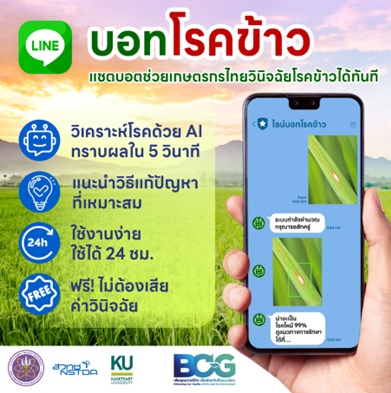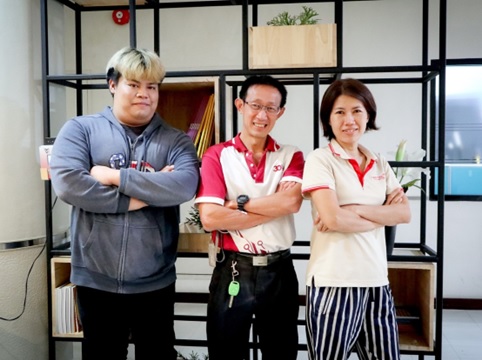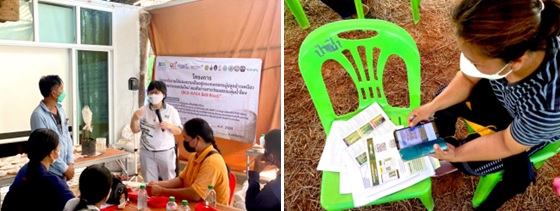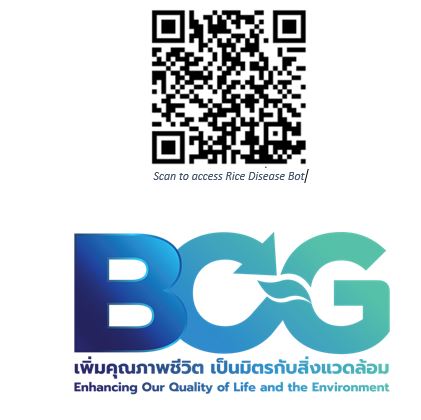Thailand ranks fourth in the world in terms of rice production and export, with an annual production of 26 million tons. Despite this impressive record, Thai rice farmers are faced with multiple challenges including higher production costs, impacts of climate change and disease outbreaks.

To help farmers cope with diseases that can damage the production, researchers from NECTEC-NSTDA and Kasetsart University co-developed Rice Disease Bot, a chatbot providing an image-based rice disease detection service and suggestions on disease management, enabling farmers to take swift actions to manage diseases, avoid excessive use of chemicals, and improve quality and quantity of Thai rice production.

Mr. Wasin Sithupinyo (center) with the research team
Mr. Wasin Sinthupinyo, a researcher of NECTEC Artificial Intelligence Research Group, explained the development of Rice Disease Bot which was conceived in 2019 as a collaborative project between NECTEC and the Department of Plant Pathology, Faculty of Agriculture, Kasetsart University. The project set out to design a central platform for farmers to gain a convenient access to an effective disease diagnostic tool and obtain suggestions to remedy the problem and avoid the wide spread of diseases.
“The idea led to the design of an AI-empowered digital platform Rice Disease Bot. The platform is simple to use and can be accessed through LINE application. To use this platform, users take photos of infected crop and submit them to the platform via chat feature. The platform employs artificial intelligence (AI) and deep learning to make an analysis. Results along with recommendations on disease management are then provided to users within 3-5 seconds.”
The development of Rice Disease Bot requires an integration of various expertise including plant pathology, image database creation, and AI development, as well as collaborations from various research groups, including Kasetsart Department of Plant Pathology and Department of Computer Engineering.
“Currently, the platform is able to identify ten rice diseases important to Thai rice production. These are rice blast, bacterial leaf blight, brown spot, narrow brown spot, bacterial leaf streak, neck blast, false smut, leaf scald, dirty panicle, and rice ragged stunt. It is open for service to farmers, public and private organizations. The system is linked to experts to check the accuracy of analysis and provide suggestions to farmers.”
This platform is being promoted to farmers throughout the country by the team at Kasetsart University and agencies under the Ministry of Agriculture and Cooperatives. At the moment, there are approximately 3,500 users.

Dr. Sujin Patarapuwadol, assistant professor of the Department of Plant Pathology, Kasetsart University is one of creators behind Rice Disease Bot. After the system was launched in 2022, she and her team organized workshops introducing Rice Disease Bot to 3,200 farmers in Lampang, Chiang Rai, Udon Thani and Nakhon Phanom under the BCG-Naga Belt Road project that aims to utilize modern agriculture technology to improve income and uplift the livelihood of glutinous rice farmers in the Mekong basin.

“Farmers who had used the platform found it to be user-friendly, convenient and fast and showed interest to recommend the system to their peers. The data collected from the system are also useful from the epidemiological standpoint for disease surveillance and preparedness plan.”
Still, there are other factors apart from diseases that affect rice production. These include insect pests and nutrient deficiency. Therefore, this platform will require further development to address farmer’s needs.
Rice Disease Bot exemplifies the integration of scientific disciplines and collaboration across agencies to bring a practical solution to Thai farmers to facilitate sustainable growth of Thai rice industry. It also follows the guideline of Bio-Circular-Green Economy (BCG) model to strengthen bioeconomy and grassroots economy.
Farmers and any individual interested to use Rice Disease Bot can scan below QR code to access the system. For research collaboration, please contact NECTEC.

